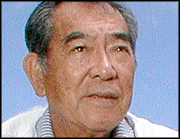Advertisement - Click to support our sponsors.


View Point
ON Nov. 9, 2000, I was one of 1,816 registered guests at the dedication of the National Monument to Japanese American Patriotism in Washington, D.C. It is located between our nation's Capitol and Union Station, and is walking distance from either site. Monument pays
tribute to AJA patriotsThe memorial and dedication speeches were excellent. But an electrifying feeling came from the realization that 90 percent of the people around me were internees or descendants of the 120,000 Japanese Americans forcibly removed from their West Coast homes soon after the attack on Pearl Harbor on Dec. 7, 1941.
I was at the memorial dedication service to top off my mission to pay tribute to my Medal of Honor brother, Staff Sgt. Robert Toshio Kuroda. I wanted to offer special prayers at the Japanese American Memorial Wall, which holds the names of over 800 AJAs killed in action during World War II.
However, I soon learned that there was a greater reason to be there. The event helped provide closure to the trauma suffered by the multitude of persons of Japanese ancestry incarcerated in desert camps behind barbed wires and armed military guards during World War II (1942-45).
The memorial contains a 14-foot sculpture with cranes entangled in barbed wire depicting an attempt to free themselves from oppression, the plight of our population of Japanese ancestry at that time.
"We made it," announced Rear Adm. Melvin H. Chiogioji (USNR-Ret.), chairman of the National Japanese American Memorial to Patriotism Foundation, in his speech.
Those words soon took greater meaning when I learned that in 1988, Mike Masaoka, 442nd Regimental Combat Team veteran and a key AJA lobbyist in Washington, proposed to the AJA veterans attending the Nisei Veterans Reunion in Reno, Nev., that the government be asked to approve a national memorial.
Congress authorized the memorial to be built on federal land with private funds five years ago. More than 20,000 donors responded. Hawaii's people in attendance numbered only 114 but the 2,000 Hawaii donors represented an impressive 13 percent of the 15,000 individual donors.
The literature shows how volunteers struggled to raise money for a memorial to be built for posterity, and how perseverance finally won out.
"We made it" was not only a sigh of relief but the success of a dream to remind future generations of AJAs to never forget the sacrifices of the World War II generation.
Chairman Chiogioji conveyed the thoughts and attitude of a populace raised in a democracy but with the discipline and lip-biting perseverance of an ancestral culture that brought us through such troubled times.
"No apology, no token compensation can erase the suffering, the lost years and the lost savings incurred on the issei and their children and can never be truly compensated," Chiogioji said. "But let the record show that this great nation, once the war had been won, had the courage and the conviction to admit its error and the greatness to offer its public apology."
I was so moved by the event that throughout my visit and all the way home to Hawaii, I proudly displayed my memorial event name tag. It hung around my neck like a child on a field trip and read: "Patriotism, Perseverance, Posterity -- National Memorial to Japanese American Patriotism."
I shall never forget that dedication. My country's government said, "We made a mistake and we apologize to the Americans of Japanese ancestry by donating this land on which we can together bulding this memorial to recognize Japanese Americans as loyal and patriotic American citizens."
Joe Kuroda, a former Hawaii state senator,
was one of four brothers who served in
the military curing World War II.